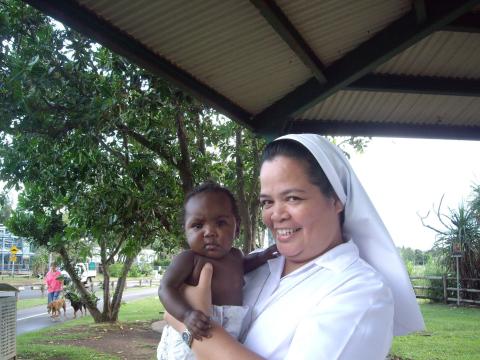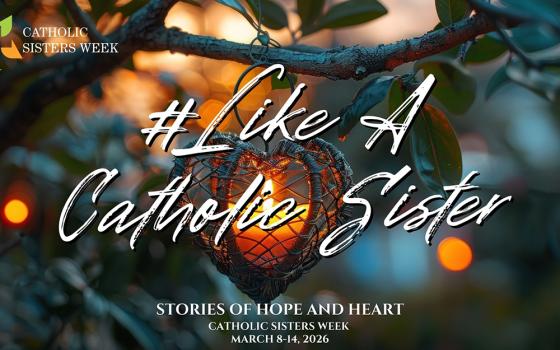
Sr. María Valentina Rebollos Paragas is pictured in the vegetable garden she and her fellow sisters established in 2006 to provide food for the children of the improvised orphanage in the mountains of Natarbora, near Bidau, East Timor. (Courtesy of Sr. María Valentina Rebollos Paragas)
Out of zeal to protect children and the most vulnerable, Dominican Sr. Maria Valentina Rebollos Paragas has faced extraordinary hardships as a missionary in the Philippines, Australia and East Timor.
"When I came to East Timor in 2001, I knew myself deeply, both in my own vulnerability and in my strength to be a missionary," Rebollos Paragas told Global Sisters Report. "The war had just ended then, and as Dominicans, we have a mission to protect the children, many of them orphaned by war. It was a test of true missionary dedication."
"To be a missionary in places of conflict and violence is to witness God's peace is possible": Sr. María Valentina Rebollos Paragas
Rebollos Paragas is originally from Presa Curuan, Zamboanga City, in the Philippines. Before becoming a religious, she obtained a bachelor's in elementary education from Western Mindanao State University in 1987. A year later, she joined the Dominican Missionary Sisters of the Rosary, whom she had known since high school.
As a religious sister, she completed the Sisters Theological Formation program at St. Thomas University in Manila from 1992-1995. Later, while working as a teacher at St. Joseph's Filipino-Chinese School in Zamboanga City, she attended the Ateneo de Zamboanga University to pursue her Master's in Guidance and Counseling. Eventually, she was sent to Manila to be assigned to a dormitory apostolate. However, in 2001, Rebollos Paragas was sent on a mission to help promote and protect children in East Timor.
"I went as a missionary to Timor to work first at the home boarding school in Soibada, Manatuto District, and later, at the Dominican Orphanage in Bidau; I stayed for seven years in this apostolate," Rebollos Paragas said.
The Timorese Civil War broke out in 2006, increasing violence and political tension across the country while adding more difficulties to the Dominican Sisters' work. "Amid the war, we did not know which people were enemies and which were not," Rebollos Paragas said. "We only knew that our mission was to protect the children from violence and barbarity."

Sr. María Valentina Rebollos Paragas worked with the descendants of the Aboriginal people in Darwin, Northern Territory, during her time in Australia in 2008. (Courtesy of Sr. María Valentina Rebollos Paragas)
The children's home in Bidau served more than 70 boys and girls of all ages victimized by the war, whom the sisters cared for and gave a primary education.
"We had moments of extreme danger around the orphanage," Rebollos Paragas said. "We were threatened several times. We had to escape to a nearby mountain to save the children from violence. There, we had to improvise an orphanage, grow a vegetable garden, and learn to fish in ponds and raise animals for food."
"We Catholic sisters must remember that God loves us and sends us to love others, especially the most vulnerable": Sr. María Valentina Rebollos Paragas
Sr. María Valentina Rebollos Paraga is pictured on the inauguration of the building of the Solidarity-Inspiration of the Poor Foundation, Inc., an NGO that she runs and serves over 1,500 children in Isabela City, Basilan, Philippines. This event took place in November 2023. (Courtesy of Sr. María Valentina Rebollos Paragas)
The sisters and children remained in these conditions for seven months, which transformed Rebollos Paragas' life.
"I learned the Tetum language to communicate with people but also to be a true Timorese," Rebollos Paragas said.
Rebollos Paragas was sent to Australia in 2007, where she worked in some schools with the descendants of the Aboriginal peoples of Darwin, Northern Territory. Meanwhile, she served on the organizing team for the 2008 World Youth Day in Sydney.
Between 2009 and 2015, she led a project called Holy Rosary Family Center in Pasobolong, Zamboanga City, Philippines. "I worked there with the children of leprosy patients, both Christians and Muslims," Rebollos Paragas said. "They were the most vulnerable in society at that time."
![Sr. María Valentina Rebollos Paraga with the team of "SOLIDARIDAD-Inspiracion de los Pobres Foundation, Inc." [Solidarity-Inspiration of the Poor Foundation, Inc.], an NGO that she runs and serves over 1,500 children in Isabela City, Basilan, Philippines, in November 2023. (Courtesy of Sr. María Valentina Rebollos Paragas)](/files/2024-02/5.jpg)
Sr. María Valentina Rebollos Paraga with the team of "SOLIDARIDAD-Inspiracion de los Pobres Foundation, Inc." [Solidarity-Inspiration of the Poor Foundation, Inc.], an NGO that she runs and serves over 1,500 children in Isabela City, Basilan, Philippines, in November 2023. (Courtesy of Sr. María Valentina Rebollos Paragas)
Rebollos Paragas lived in Spain for five years to continue her philosophical and theological formation at the Comillas Pontifical University, which she completed in 2020.
"I went back to Zamboanga in 2021 to be head of the Dominican School," Rebollos Paragas said. "There, the big challenge was the three super typhoons that wiped out the school facilities. We had to rebuild them with people's help."
Rebollos Paragas is currently working as the project manager of an NGO called "SOLIDARIDAD-Inspiracion de los Pobres Foundation, Inc." [Solidarity-Inspiration of the Poor Foundation, Inc.] which at the moment serves more than 1,500 children in Isabela City, Basilan, Philippines. This project is done in collaboration with ChildFund Philippines, which seeks to promote education and protect children and their families from violence and exclusion.
"To be a missionary in places of conflict and violence is to witness God's peace is possible," Rebollos Paragas said.
"We Catholic sisters must remember that God loves us and sends us to love others, especially the most vulnerable."
"Unfortunately, in 2006 came the civil war, where the fight was among the citizens. It was a test for us because we, as sisters, worked for children whose relatives belonged to different groups": Sr. María Valentina Rebollos Paragas
GSR: What has most marked your life as a missionary?
Rebollos Paragas: In 2001, I had my first missionary assignment in East Timor. It changed me, or my perspective in life, and transformed my way of dealing, living with and working in mission.
When I arrived there, it was the period after the Indonesian-Timorese war. So, it was the beginning of building the communities and the government. In fact, the world came to the rescue to aid East Timor then. In 2002, we saw the flag of independence furled over the East Timor skies, with tears flowing from the eyes of many during that day.
Unfortunately, in 2006 came the civil war, where the fight was among the citizens. It was a test for us because we, as sisters, worked for children whose relatives belonged to different groups. So, to prevent violence from ever imprinting on the young minds of children under our care in the orphanage, we fled to the mountains of Natarbora, an isolated farmland we tilled for their food sustenance.
We were very few, just three aspirants, two postulants and I. However, we were ready to flee with more than seventy children. Our lodge in the mountain lasted seven months!
That situation brought me closer to God — I saw his providence throughout the journey, from learning how to till the ground to fishing and the true practice of mendicancy for the provision of children.
Advertisement
Why should the church be in the places with the most suffering?
The church is in most places where people are in human or spiritual need. We need to bring hope and manifest through our lives joy and enthusiasm, to be bearers of good news to many.
As Missionary Dominican Sisters of the Rosary, this is the very heart of our presence in the world: Our charism consists of going to those missionary situations where the church needs us most. Our founders, Mother Ascension Nicol Goñi and Monsignor Ramon Zubieta, exemplify this charism to us all by having the first foundation of our mission in the jungles in Maldonado, Peru.
For me, it has become our mark in missions to be at the side of the most vulnerable, the least among many others. "To act with justice and to love tenderly," as the Book of Micah reminds us … we who are the church.
"To prevent violence from ever imprinting on the young minds of children under our care in the orphanage, we fled to the mountains of Natarbora, an isolated farmland we tilled for their food sustenance": Sr. María Valentina Rebollos Paragas
How do you find God in your missionary work?
I have encountered him both in joys and in difficulties. I even felt his closeness even in the midst of the uncertainty of war. I continue to find God in my daily life. I strongly believe that God has been so faithful!
For example, since arriving in SOLIDARIDAD six months ago, I have been fascinated by the challenge of interreligious dialogue because, in our office, we are an extraordinary staff mix of Muslims, Protestants and Catholics working together under the Prelature of Isabela of Basilan.
It has given me a chance to work on my understanding of God and the society where I live. Every day is an occasion to be people of peace. We dialogue with our verbal and non-verbal expressions. We strive to learn, accept and be more open to others' opinions and find God's way of dealing with us in various situations where challenges of community life and inclusive decisions have to be taken into consideration.
God works with us; we are in this together. This makes me remember Deuteronomy, where God is implored to go with the people: "I pray to you, go among us; for it is a stiff-necked people; and pardon our iniquity…". Many times, I pray this prayer, that we can be God's instrument of peace here or wherever we may be.







